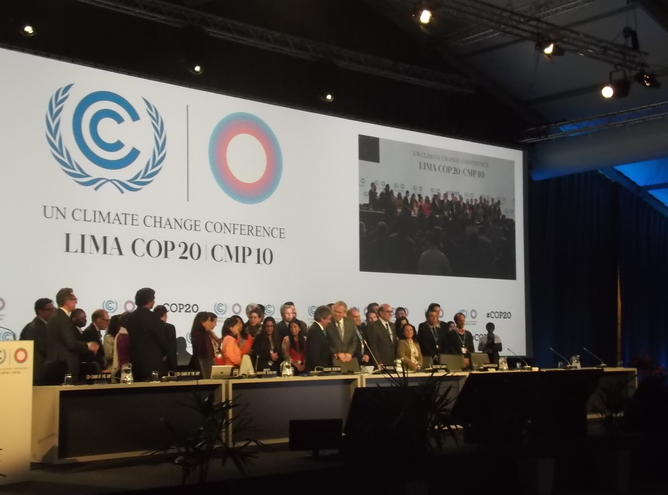
Lima Climate Agreement — Experts React

This article was originally published on The Conversation. The publication contributed this article to Live Science's Expert Voices: Op-Ed & Insights.
After running long past its scheduled finish time, the United Nations Lima climate talks finally delivered an agreement on Sunday that should see all countries, not just developed ones, pledge to cut their emissions after 2020.
But the deal still leaves much uncertainty and could reduce the amount of scrutiny that countries' climate plans will receive as the negotiations inch their way towards a possible deal at the crucial talks in Paris next December.
Here, our experts give their verdicts on the summit and its outcome.
Peter Burdon, Senior Lecturer, University of Adelaide
The Lima climate deal has two critical consequences for developing countries.
First, clause 4 urges developed countries to “provide and mobilize” financial support to help developing countries deal with the effects of climate change. To date, only US$10 billion (A$12 billion) has been allocated to the Green Climate Fund (10% of the annual target). This is clearly insufficient, and as Secretary of State John Kerry announced to delegates: “When Typhoon Haiyan hit the Philippines last year, the cost of responding to the damage exceeded US$10 billion.”
Get the world’s most fascinating discoveries delivered straight to your inbox.
Second, developing countries succeeded in reintroducing clause 11, which recognises their “special circumstances” in setting emissions-reduction targets. Australia (alongside the United States) fought against special status, arguing that: “It doesn’t matter where the emissions come from, they are global emissions."
This was the deepest fault line to emerge in Lima and we should expect it to erupt as pressure builds to reach a binding deal in Paris next year.
Nigel Martin, Lecturer, College of Business and Economics, Australian National University
While it was nice to see the Global Climate Fund (GCF) reach its US$10 billion capitalization pledge during COP20, there is still a long way to go in terms of reaching the US$100 billion funding level by 2020. As a general principle, the A$200 million pledged by Australia is a good start, but if we look at our contribution to global emissions at about 1.3%, we only offered to fund around 0.2% of what is needed by 2020.
So in relative terms, while we probably need to do more, is it possible? Looking at the patchy Australian economy, and the International Monetary Fund’s global growth predictions of around 3.8% over 2015, the fiscal situation looks tight going forward. Importantly, we think the GCF is probably going to need more money from private sector organizations in order to prosecute the mitigation and adaptation projects the UN has in mind.
It will be interesting to see whether private organizations in Australia, especially some of the big ones like BHP Billiton and Rio Tinto, commit to any funding. My guess is the Australian government will need to provide some tax incentives or look at issuing some type of ‘green’ bonds to get the private sector more engaged.
Ian McGregor, Lecturer in Management, UTS Business School
With 196 sovereign states involved and global energy systems a key part of global economic systems, the major problem is overcoming the resistance to major change.
The traditional United Nations negotiating system is not really the way to address this critical problem as we need a system that build a clear global shared vision of an ecologically sustainable economic and social system.
Poverty is one of the other major global issues, and developing countries are not that willing to move away from fossil fuels as that is how developed countries got wealthy, as well as some that are still classified as developing. For example, Saudi Arabia and Qatar have higher per capita gross domestic products and per capita emissions than most developed countries.
However, I do not know how we could move to a more effective system given how entrenched this treaty/protocol negotiating process is entrenched in the UN systems.
This article was contributed to The Conversation by Ian McGregor, University of Technology, Sydney; Nigel Martin, Australian National University, and Peter Burdon.
This article was originally published on The Conversation. Read the original article. Follow all of the Expert Voices issues and debates — and become part of the discussion — on Facebook, Twitter and Google +. The views expressed are those of the author and do not necessarily reflect the views of the publisher. This version of the article was originally published on Live Science.
 Live Science Plus
Live Science Plus





